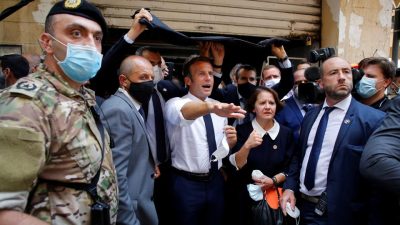France Aims to Counter Turkish Influence in the Middle East by Gaining a Foothold in Lebanon

French President Emmanuel Macron has visited Lebanon for the second time in less than a month following the terrible blasts that destroyed Port Beirut. Macron first visited Lebanon on August 6, two days after a warehouse with 2,750 tons of ammonium nitrate exploded, killing 190 people, injuring another 6,500 and leaving 300,000 citizens homeless. The detonation, one of the largest non-nuclear explosions in history, is undeniably the result of corruption, greed and the incompetence of politicians that has become an endemic problem in Lebanon. The explosion has only exacerbated the collapse of the Lebanese economy.
The cost of property damage caused by the explosions varies between $3.8 billion and $4.6 billion, while the economic damage amounts between $2.9 billion and $3.5 billion, according to a World Bank estimate. In total, $6.7 billion to $8.1 billion has been slashed from Lebanon in total. This in a tiny country of just a few million citizens already economically suffering.
After landing on August 31, Macron met legendary actress and singer Fairuz, a Christian who is one of the few Lebanese figures that is admired across the different faiths in Lebanon. Officially, the purpose of the French head of state’s visit was obvious – to ensure that the conditions were met for the formation of a new government that was capable of carrying out the essential tasks of reconstruction and reforms in Lebanon. The changes are urgent in the electricity and banking sectors, as well as in the public market that is currently too opaque, which favors irregularities. To see how urgent these changes are needed, consider that Beirut does not yet have 24-hour electricity for its residents.
Macron’s goal, declared to the press, is to avoid Lebanon ending up “in the hands of the vileness of the regional powers” and to prevent the country from falling into a new civil war. This will prove difficult as regional powers, such as Turkey, Saudi Arabia and Iran, are all competing for influence in Lebanon. Although the Sunni Muslims can fall back on Turkish and Saudi patrons, while the Shi’a have Iranian patronage, the Christians of Lebanon, whom by constitution always occupy the presidency, do not have such state-backing like their Muslim counterparts. And this is exactly what Macron can exploit.
The undeclared objective is to control the transformation process and, consequently, to be the repairer of Lebanon in order to maintain an important bridgehead that guarantees its political and commercial interests, not only in the East Mediterranean, but also in the Middle East. France’s fight is actually about maintaining its privileged role as a former colonial power there, a source of criticism against Paris but which is well received by the main Lebanese Christian forces, who claim that they are not only suffering from an economic and political crisis, but also existential.
“Lebanese people, you are like brothers to the French. I promised you: I will come back to Beirut to take stock of the emergency aide and help you build the conditions for reconstruction and stability,” Macron tweeted on Tuesday.
The coming weeks will be critical for reforms in Lebanese politics and it remains to be seen how much Macron can influence these critical but continuously delayed necessities. As a former colonial power, even if it was just for a few decades, France feels it has a right to expand its influence into Lebanon. With France on a path towards greater independence in its foreign policy, moving further away from the interests of Washington and Berlin, and having ambitions to become a stronger power than it already is, Macron is attempting to reclaim France’s former colonies as its spheres of influence. This is occurring most notably in Africa, where it is currently challenging Turkish attempts to spread its interests. However, France is now on the offensive to bring the Franco-Turkish struggle to a new arena, the Middle East.
By gaining a foothold in Lebanon, Macron can weaken Turkish attempts to become the gatekeeper of the Sunni stronghold of north Lebanon, while being able to project its influence into neighboring Syria, also a former French colony. From Lebanon, Macron can then also project his power further into the East Mediterranean where France is currently backing Greece and Cyprus against Turkish maximalist behavior. However, Macron’s interests in the Middle East is not only reduced to its former colonies, but also expands into Iraq. Macron visited Baghdad on Wednesday after Lebanon. In Baghdad, Macron gave his full support to Iraqi sovereignty in face of Turkey’s illegal military intervention in the north of the country that recently killed Iraqi soldiers.
Although French and Turkish interests are clashing in the East Mediterranean and Africa, by Macron becoming the gatekeeper of Lebanon, the French President is expanding his country’s influence and challenging Turkish expansionism in a new arena – the Middle East… but it all begins in Lebanon.
*
Note to readers: please click the share buttons above or below. Forward this article to your email lists. Crosspost on your blog site, internet forums. etc.
This article was originally published on InfoBrics.
Paul Antonopoulos is an independent geopolitical analyst.
Featured image is from InfoBrics

